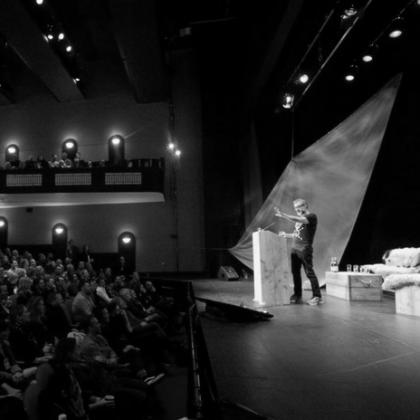Jamie Oliver’s cookery book, “30 Minute Meals” is the highest-selling non-fiction book ever in the U.K. Last week, it sold over 97.000 copies, and it is a runaway train: in mid-November it was shifting 15,000 copies a week, an incredible figure, but modest in comparison to the 100,000 it will likely sell this week.
This is a good thing.
But, before we explain why it is a good thing, a little explanation as to how you get from 15,000 to 100,000 in a few weeks. A week ago, we showed our copy to our friend Eve. When we met her on Saturday, she said that she had bought a copy. Not for herself. Or even her family. No, Eve had bought a copy for her daughter’s boyfriend. It’s that kind of book. Lot’s of daughter’s boyfriends are going to be finding a Jamie in their Xmas stockings.
Why is the book such a phenomenon? The first reason is that it is didactic, but in a charming way. Oliver has a simple mission: in a society where fewer and fewer people cook from from scratch, he wants people to do just that. But he has realised, through the setbacks encountered with his school meals mission, that this is not easy.
So, the only way to make it happen is to make it as easy as possible for people. You have to show them how it’s done, and “30 Minute Meals” is radical because it’s not about completion – the finished dish prettily arranged on the plate – it’s about the process.
He shows you how, but not step by step. Instead, he shows the beauty of the engagement with the process. It’s a bit like marveling at Roger Federer on the court, and then going out and getting the racquet and getting down to your local court. You aren’t going to be Federer, but there you are, out hitting the ball, engaged, inspired.
In this alone, Oliver achieves what others fail to do. You can have all the Home Ec classes and the Obesity Taskforces and the HSE guidelines you like, but unless you enthuse people, engage them, inspire them, then you are not going to wean them away from the takeaway and the processed food eaten straight from the microwave.
Oliver is succeeding where politicians and politics has failed. Politicians and their like TELL you what you should be doing. Oliver shows you that you should be doing this because it’s a lot of fun. His book, in a very grand sense, is what we call a Nudge: you do what he wants you to do, not because it’s what you should do, or because it’s better for you: you do it because it’s the craic.
What Jamie Oliver is achieving is what used to be known as Public Service. For people of tender years, that expression will mean little. But back in the day, doing public service was expected of people. Only doing things because you are paid to do them gives us a society where the Gordon Ramsays are judged to be important.
But the Greedy Gordons aren’t important: they are just selfish, and greedy, and grasping. Oliver, with his brilliance and his Public Service ethos, is the very antithesis of the Greedy Gordons, and his success is cause for optimism.







